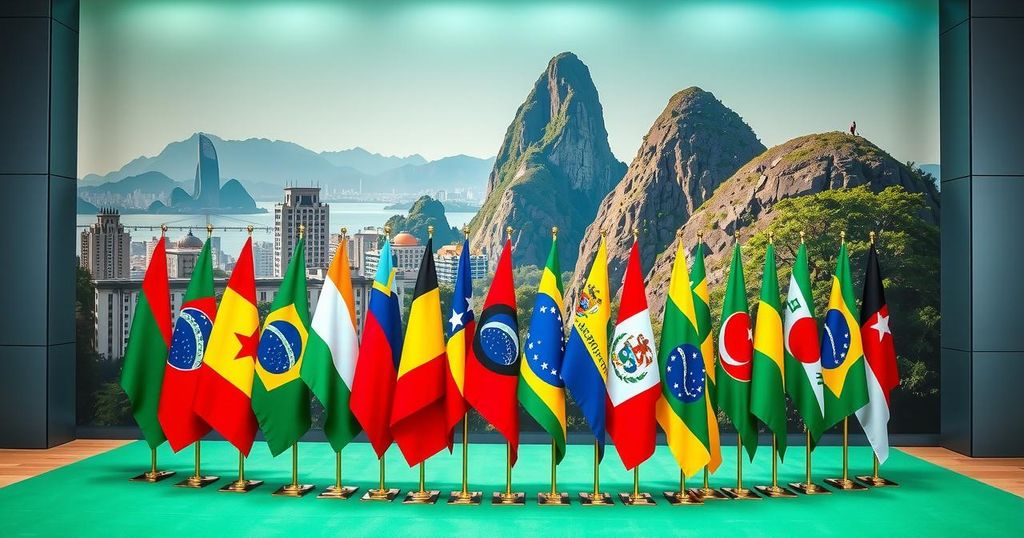The BRICS meeting in Brazil focuses on countering Trump’s trade tariffs and global economic instability. Foreign ministers from member states discussed collective action and geopolitical issues, with an emphasis on dialogue amid crises. Climate change and alternatives to dollar dependency are also key agenda items.
In a significant meeting in Rio de Janeiro, the foreign ministers of BRICS nations, including Brazil, China, and Russia, began talks today focusing on the implications of U.S. President Donald Trump’s recent trade policies. This gathering, lasting two days, aims to solidify a collective stance against the aggressive tariffs imposed by the U.S., particularly as the International Monetary Fund recently revised global growth expectations downwards.
During the talks, Brazilian Foreign Minister Mauro Vieira emphasized the critical role of dialogue amidst rising humanitarian crises and political instability worldwide. He urged that BRICS’s importance as a coalition is heightened in these times of escalating tensions, particularly relating to trade and geopolitical conflicts.
Trump’s tariffs have hit many countries hard, with Chinese imports facing towering tariffs of up to 145 percent. In retaliation, China has instituted its own tariffs on U.S. goods, escalating tensions. Zhao Chenxin, a senior economic planner from China, remarked that they remain on the “right side of history” while denouncing U.S. policies as unilateral and bullying.
BRICS, which originally formed in 2009 as a coalition of Brazil, Russia, India, and China, has since expanded to include other nations. Currently, the bloc represents about half of the global population and 39 percent of the world’s GDP, actively participating in discussions around crises from Gaza to the conflict in Ukraine.
Vieira opened the discussions with a call for Israel to withdraw forces from Gaza, labeling the ongoing aid blockade “unacceptable.” While BRICS has been more reserved regarding the conflict in Ukraine, they expressed a desire for a diplomatic approach that respects the United Nations charter’s principles.
As tensions persist in Ukraine, Russian President Putin has declared a short ceasefire to encourage peace talks. However, the U.S. has expressed skepticism about its effectiveness. Trump’s recent comments on prioritizing a permanent ceasefire indicate ongoing complexities in U.S.-Russia relations, further impacting the BRICS agenda.
One of the standout topics on BRICS’s agenda is the potential challenge to the dominance of the U.S. dollar in global transactions. Discussions have already hinted at an inclination towards increasing the use of national currencies among BRICS nations. Lavrov, Russia’s Foreign Minister, indicated that these discussions are ongoing but cautioned that the concept of a unified BRICS currency is still in the early stages.
Climate change is also expected to lead to significant discussions. Brazil, hosting the upcoming UN COP30 climate conference in November, is uniquely positioned to influence this agenda. Though Vieira reassured that Brazil has largely escaped the worst of Trump’s tariff fallout, with imports facing just 10 percent duties as opposed to China, it remains to be seen how trade relations will evolve amid this geopolitical landscape.
The BRICS meeting in Brazil underscores the urgent need for a unified approach in light of escalating global tensions, particularly regarding trade dynamics exacerbated by U.S. policies. As discussions unfold, BRICS aims to establish a cohesive stance on issues ranging from tariffs to climate change, potentially reshaping global financial transactions by challenging dollar hegemony. The stakes are high, and the outcomes of these talks could markedly influence the economic landscape in the near future.
Original Source: www.hindustantimes.com






